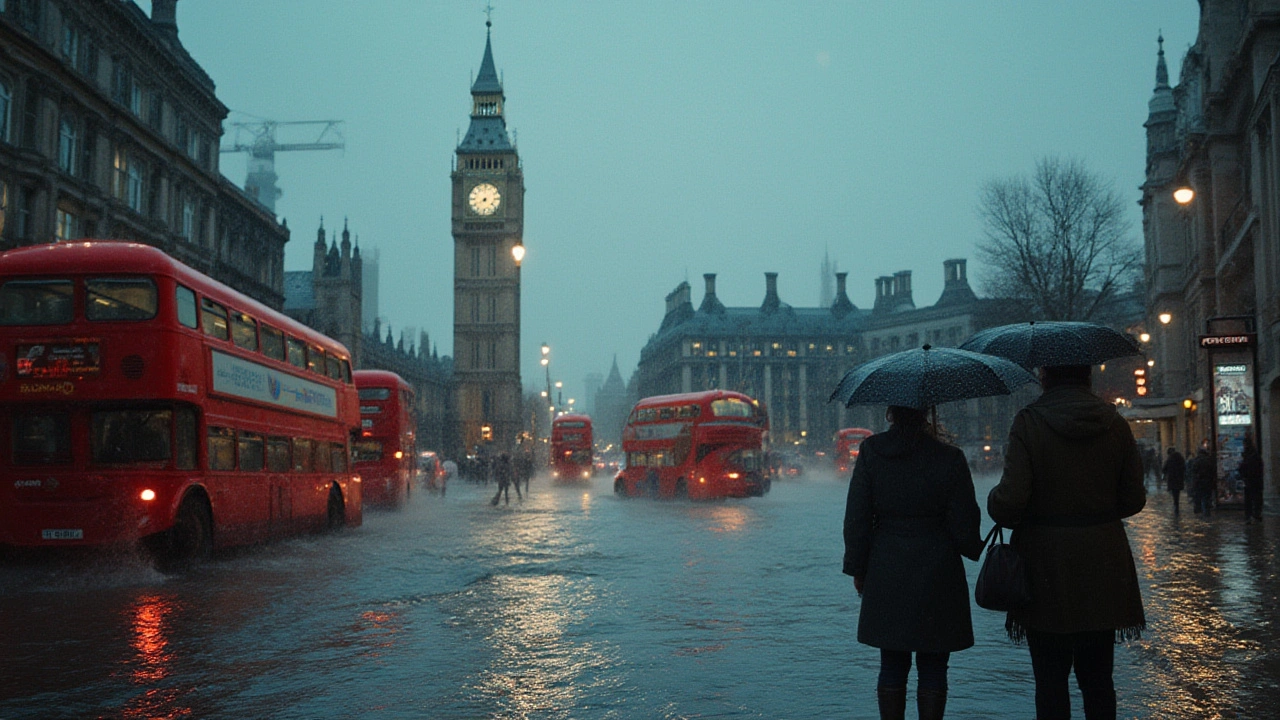
The news cycle never slows down, but right now it feels like the world is sprinting at full speed, barely stopping for breath. Everywhere you turn—whether it’s your phone pinging late at night or colleagues whispering at work—there’s talk about politics rocking the world, our planet sweating through the hottest summer in memory, and tech breakthroughs making today's science fiction tomorrow's reality. The year 2025 has already seen a handful of events so big, their impact stretches from bustling city streets in London to quiet farms in Brazil, from high-rise offices in Shanghai to rural homes in Africa. Ignore these waves, and you’ll be caught swimming upstream.
World Elections Unleash a Global Ripple Effect
Up close, the ballot boxes in 2025 might look just like they've always done: cramped polling stations, impatient voters with coffee spills on their shirts, the old man reading the paper in the corner. But zoom out, and you see something much bigger. This year has smashed the modern record for simultaneous elections. Over 60 countries are heading to the polls, including global heavyweights like India, the United Kingdom, and the United States. It’s not just the sheer numbers—it’s the stakes. Political tensions are through the roof, with issues like climate, migration, and digital rights front and center.
If you're wondering why it matters, consider this: the governments being chosen now will decide how fast the world shifts off fossil fuels, how much personal data companies can collect, and even what news you see online. In India, for example, over 900 million citizens—almost one in eight people on Earth—have the power to tilt not only domestic policy but prices for everything from rice to microchips worldwide. American voters, meanwhile, are facing one of the tightest and most fiercely debated races in decades, with new faces challenging the old guard and record turnout projected, thanks to next-gen online voting platforms.
There’s drama on the continent, too. The UK’s snap election saw a youth turnout surge after months of political deadlock, with climate activists now pushing for the greenest government yet. Social media drives, including a viral TikTok campaign urging first-time voters to take selfies outside polling stations, have changed the way politicians campaign in real time. No more speeches to empty halls—now it’s all about trending hashtags, livestreams, and meme wars.
Russia’s situation remains tense, especially amid the ongoing fallout from last year’s regional unrest. Voters are split on how to handle international sanctions and the future of disputed territories. In Brazil, Amazon protection has become the cornerstone of this year’s campaign, with city dwellers and Indigenous leaders both demanding urgent action.
Here’s a tip if you want to grasp where the world is heading: pay more attention to elections outside your country than ever before. Trade agreements, migration policies, and even job markets are affected by ballot box results oceans away. Tracking just three or four races outside your own borders will put you far ahead of most when it comes to understanding tomorrow’s headlines. And if you’re traveling or living abroad, brush up on new voter ID rules—a ton of countries this year have tightened (or loosened) requirements, especially for digital and absentee ballots.

A Relentless Climate Crisis Redefines Daily Life
No need to check your weather app—people everywhere are complaining about the record heat. 2025 is smashing temperature records, and the numbers don’t lie: the global average is up nearly 1.5°C compared to pre-industrial levels. That’s the marker scientists warned was a point of no return, and it’s not just an abstract target anymore. Europe’s heatwaves have sparked wildfires from Spain to Greece, with blackouts rolling through city centers notorious for nightlife and traffic. Southern France saw its hottest May since records began, pushing hospital ERs to their limits and melting roads in Marseille.
Water, too, is suddenly a luxury. In Cape Town, South Africa, 'Day Zero' loomed again after years of drought—meaning, for a while, millions lined up for rationed buckets, and swimming pools dried up to dusty tiles. California saw wildfires jump containment lines to threaten brand-new suburbs, erasing homes faster than people could evacuate. In China’s Yangtze Basin, heatwaves arrived months earlier than expected, torching crops and pressuring a government already struggling with supply chain snags from last year’s floods.
This summer has become a crash course in climate adaptation. Across the Mediterranean, cafes and schools have swapped out glass doors for thick, reflective film. Paris trialed mandatory 'siesta hours' during the hottest part of the day for the first time since WWII, halting construction, closing playgrounds, and handing out cooling kits with rehydration salts. Cities like Tokyo and Los Angeles have launched campaigns urging citizens to plant rooftop gardens, not just for vanity but to slash surface temperatures by a few crucial degrees.
Some governments have raced to respond with sweeping (yet controversial) changes. Singapore, often the techie’s dream, rolled out cloud-seeding drones that try to wring rain out of stubborn skies. The UK’s parliament declared a fresh climate emergency and rushed subsidies for commuters ditching petrol cars. Solar panel fitters are swamped with orders from families who, just a year ago, thought it was a luxury.
But there’s another side: climate costs mean higher food prices and increased insurance premiums, which hit the poorest hardest. In Bangladesh, rising sea levels forced another wave of mass migration—families moving inland, losing centuries-old farmland to saltwater. Meanwhile, students in New York now have 'climate education' built into their curriculum, learning about not only solar panels but how to prep 'go bags' for disaster.
If you want to protect your home (and wallet), now’s the time to get serious: check attic insulation, join local community groups working on resilience projects, and keep hydrated when the forecast turns orange or red. Continent to continent, people are learning that small daily adjustments—like timing outdoor errands or investing in smart thermostats—aren’t just sensible but necessary to cope with an unpredictable world.

Artificial Intelligence Breaks Out of the Lab
AI isn’t just chatbots anymore. This year, it’s on the table in government offices, running in the background on city streets, and helping solve real problems—sometimes in ways that scare as much as amaze. In 2025, artificial intelligence systems cracked big puzzles in medicine, disaster response, and even personal security, but not without controversy and a lot of pushback.
You probably already know AI writes some news articles (maybe not this one!), but did you hear that in the US, courtrooms began using AI-driven sentencing advisors to offer second opinions? These tools sifted through case law and, in studies, managed to reduce sentencing bias by a measurable degree. On the other side of the Atlantic, the NHS in the UK rolled out a diagnostic AI that flags rare cancers on scans, speeding up how fast doctors can catch deadly illnesses. It flagged one in every six patients as needing extra tests—helping save lives, but sparking fierce debate about data privacy and decision-making power.
Fed up with queueing for the passport office? Singapore tested facial recognition and AI-powered background checks that dropped waiting times by 80%. In Nigeria, teachers used new automated lesson planners to combat shortages so severe that students were sharing chairs and textbooks. And in Brazil, weather-predicting AI gave farmers a heads-up on when to plant or harvest, helping them outfox the droughts and floods reshaping their busy seasons.
But the flip side? AI-generated scams have gotten slicker. The latest wave of phishing attacks now mimics voices and faces, with scam calls using deepfake tech to convincingly impersonate bosses or relatives. In Germany, several companies lost millions to faked emails and audio memos, despite beefed-up security. Police warn that even two-factor authentication isn’t foolproof anymore. Cybersecurity experts now recommend setting up family code words and triple-checking every urgent message about money or sensitive info.
Regulators everywhere are scrambling to keep up. The European Union rushed through a new set of AI transparency rules—forcing companies to label AI-generated videos and requiring high-stakes applications, like medical diagnosis or hiring, to pass a set of stress tests. In the US, a National AI Ethics Board now reviews consumer complaints, a kind of 'AI watchdog' with real teeth for the first time. Even day-to-day apps have changed: WhatsApp and Messenger now flag AI-generated images with a subtle watermark, helping people spot fakes before they go viral.
If you’re feeling overwhelmed by the pace, you aren’t alone. Here are a few tips to keep your digital life under control: update passwords regularly, take a few minutes to learn what a 'deepfake' scam looks and sounds like, and turn on multi-factor authentication for anything tied to banking or security.
People are still debating where AI will take us. But this much is clear: the genie’s out. Businesses, governments, and even schools are using AI to do things that would have seemed like magic just a year ago. Staying informed will help you spot both the opportunities—and the risks—before they land at your doorstep.